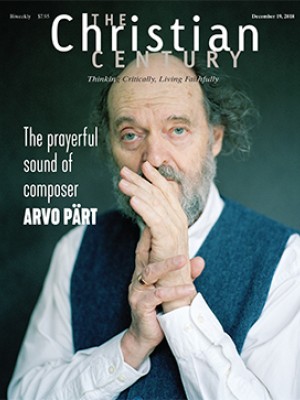Writing about faith in the golden age of television
“If you want to make a room full of liberal, compassionate people turn on you, talk about God in an unironic way.”

Joy Gregory is a writer who has worked on such shows as Joan of Arcadia and Madam Secretary. Before entering the television industry she worked in theater in Chicago. She has a particular interest in depicting people of faith in a way that, to quote one reviewer, “confounds people’s expectations.”
How were you drawn into writing for television?
I met producer Barbara Hall when she was planning a TV show about a teenager named Joan who speaks to God—what became Joan of Arcadia. She brought me in because of a pilot I had written about a 13-year-old girl in Cleveland. During the interview, all we talked about was my first play, which was about two Catholic saints with two very different ideas of spirituality: Thérèse of Lisieux and Catherine of Siena.
Read our latest issue or browse back issues.
That led to a job offer to work on Joan of Arcadia. The other offer I had at the time was to work on a WB superhero show about Tarzan. My agents were telling me, “Girl, Tarzan is going to put your kids through college. It is going to run forever.” My writer friends said that Joan of Arcadia would be like Touched by an Angel, except with a teenage girl.
I defied everyone’s advice, and I took a chance on Barbara Hall, and she took a chance on me. And it was the best thing I ever did. I followed what was really calling me instead of what looked, on the surface, like a smarter choice.
Writing for Joan of Arcadia brought me back to my first impulses for writing: I wanted to explore the mysteries and paradoxes of spirituality, and what a relationship with God is like in a contemporary life.
What do you like about writing for television as opposed to other media?
I am attracted to television writing because it brings me stability, which I had not had enough of in my twenties when working in theater. My dad was a steelworker. I am a working-class girl. I like to get up and go to the mines every morning. I love that there is a room full of writers sitting around the table, with set hours. By the end of the day, we have got to have something up on the dry erase board.
And I love the way that television speaks back to our culture in a very immediate way. On Madam Secretary, we never name any actual contemporary politicians nor do we name the political party of our administration. That is by design. But we did try to respond to the polarization of our current political moment by doing an episode where the president’s cabinet got together to say the president seemed off his rocker. Half of the cabinet worried that they were actually staging a coup; the other half felt that something had to be done.
How are religious themes treated in the writing room?
If you want to make a room full of Obama-loving, liberal, educated, immigrant-championing, compassionate people turn on you, talk about God in an unironic way. Admit to being a person of faith. They will feel sorry for you. You will see their esteem for you go down a couple of notches. So to argue for depicting people of faith as authentic, likable human beings is going to be a struggle—most writers just have this blind spot about religion.
As a result, religious stories tend to be really binary and simplistic. It is rare and wonderful when you can do stories about spirituality that aren’t hokey or earnest or easy or all about feeling or sentiment.
An exception would be the way Madam Secretary features a religion professor, Henry McCord, who is married to the secretary of state and is also a person of faith.
One reason that works is because he is by definition intellectually engaged with his faith. As a scholar, he is somewhat above sentiment. He has a historical understanding, which we love talking about on the show. I love doing research into people that he is interested in, such as St. Francis and St. Augustine. Most people know so little about the early church. So we can use that.
What shows do you watch besides the ones you are working on?
I have been enjoying The Good Place. I started watching it purely for escapism. Kristen Bell plays a flawed sinner who awakens at the beginning of the pilot in heaven. By the end of the pilot, we understand that there has been a mistake. We get flashbacks of her being an awful, shallow narcissist. At first, I just found it charming. But it starts to take on spiritual and existential themes in a really loving way.
I am also watching Ozark, which I cannot exactly connect to my love of religious tropes. Jason Bateman plays a talented financial analyst. His partners are killed by a drug cartel, and he talks his way into setting up a money-laundering operation for them in the Ozarks if they will spare him and his family.
The fun is watching Bateman get into situations again and again where he is assuredly damned, and he has to talk his way out. You feel like you are on the slow road to redemption. This is so different from Breaking Bad, which took such delight in reversing the trajectory of redemption—Mr. Chips becomes Scarface. I prefer the other direction, even though I don’t like it to be easy.
How does the long, slow road to redemption come up in your own work?
Right now, I am trying to sell a pilot that is a fictional version of Tammy Faye Bakker. I loved the documentary The Eyes of Tammy Faye. She was a figure beloved by her gay male audience not only because she embodies this drag queen, extreme version of femininity, but also because in 1984, when she was a successful televangelist with her husband, AIDS was ravaging the gay community, and Christians were nowhere preaching mercy and tenderness, she had on her program a gay man who was well into his illness. With tears running down her face, she said to her audience, “We are Christians. We should be loving this man.” She showed compassion at a time when the Christian community had not.
What intrigues me is taking a person who has been derided as the worst of American Christianity and demonstrating that her story is in fact a most authentic Christian journey. Maybe it even reflects Christ’s journey itself. In my version, a woman like Tammy Faye participated in the fraud and embezzlement that was part of her television show, and she was metaphorically crucified in the public arena. Then she starts over with a local access cable show. She becomes something like the Christian Oprah over several seasons. She becomes a different kind of Christian.
Television is uniquely positioned to take us on this kind of journey. You can cite the roots of television in the chapter-by-chapter release of a Dickens novel in Victorian magazines. However, TV stories have less certain outcomes. The hero might die if, for example, the actor who plays him turns out to be a pain in the ass.
What’s your image of God?
My 14-year-old daughter and I were watching a video of some conservationists freeing a young whale that was hopelessly trapped in nylon netting and on the verge of death. One guy was working with a snorkel, a knife, and a few friends on a nearby motor boat. After trying for several hours, knowing the whale could destroy them with one false move, they managed to free the whale, who swam away and, on a sparkling horizon, breached the water over and over again in a dance of pure joy.
Is God the patient snorkeler freeing us from our own hopeless entanglements if only we’ll dare to trust him?
A version of this article appears in the print edition under the title “Pursuing God in prime time.”






